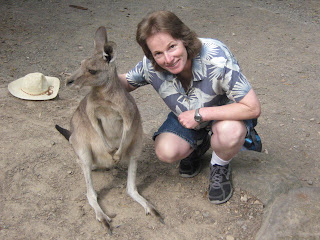 |
| Hell's Gate, Noosa coastline (Photo credit: Kathleen) |
Even aside from the spectacular locale, the conference so far has been rewarding beyond my wildest expectations. Conference organizers and delegates alike have been overwhelmingly friendly and welcoming. They strike me as a serious and thoughtful bunch, communicating a solid commitment to ethical professional practice. Both my keynote -- on the subterranean tensions between technocratic and humanistic visions for our field -- and my all-day training workshop on forensic diagnosis were very well received.
The vast continent of Australia has only 331 psychologists who are registered with the national government as forensic specialists (under the nationalization scheme that just went into effect), and it seems that most of them are here. Also in attendance are several other Americans invited to give keynote talks and all-day training workshops, including forensic guru Tom Grisso, Les Morey (the developer of the Personality Assessment Inventory) and John Edens, a prominent forensic psychologist from Texas A&M.
 |
| Blogger with Paul Wilson and conference chair Gavan Palk |
A highlight for me was to get a chance to meet Paul Wilson, an internationally renowned criminologist and human rights activist. Paul (here, we all go by first names and forego the hierarchical ribbons and badges sported by speakers and officers at the typical psychological conference in the USA) is a prolific scholar and practitioner. He has been involved in many high-profile forensic cases, including on the effects of solitary confinement and of the forced removal of indigenous Australians from their ancestral homes. His latest book is Erasing Iraq: The Human Cost of Carnage, which -- as the title implies -- details the cost in human suffering of the war.
Paul's keynote focused on the role of forensic psychologists in miscarriage of justice cases. He has significant personal experience in this area, including involvement in Australia’s most infamous case of wrongful conviction, the so-called “Dingo Case" (made into a Hollywood movie starring Meryl Streep). That was the case in which Lindy Chamberlain was convicted of murder after her infant daughter disappeared while the family was camping at the famous Ayer’s Rock. It wasn’t until six years later that the baby’s clothing was found in a nearby dingo lair, proving that the mother was telling the truth when she said she saw a dingo carry off her baby.
 |
| Blogger with a new friend |
Further south, Queensland’s major city of Brisbane looks to have recovered quite nicely from the catastrophic flooding last January. Just goes to show what's possible in a country with a more rational social policy and a decent economy.
Brisbane is an attractive, up-and-coming city with lots of cool neighborhoods. As soon as we arrived, we were lucky enough to stumble across a vibrant organic food fair. We got to nibble and sip oodles of lovely locally produced treats -- fresh produce, dairy products, meats, sauces and wines.
 |
| Swimming enclosure, St. Helena Prison |
For me, Australia has been well worth the long airplane ride to get here; I hope to come back again to see Sydney, Melbourne, and Western Australia and to visit with some of my newfound colleagues in Australia's wonderful community of forensic psychologists.

2 comments:
This all sounds most enriching and wonderful - I wish you a joyous visit! Some thoughts provoked by the description of the old prison:
"To discourage escape during the harsh old days, prison warders attracted sharks by dumping cow offal along the beaches." - what a mine of images! Cows still occupy the same position - helpless victims - as in the "harsh old days", their very deaths - and innards - enlisted in human justice procedures, as the quartered bodies of traitors centuries before; sharks - still victims of the cruel sharks' fin industry - conscribed as aides in humans' struggle to confine conspecifics.....And then again: the progress of this location: the "criminally insane"....the "well behaved", the "aged and infirm" (i.e., past trouble-making (?)): The whole intermingling of thought and practice in the context of someone else's land and history.......truly food for thought there!
Thanks very much, Cavall. Interesting musings!
Post a Comment